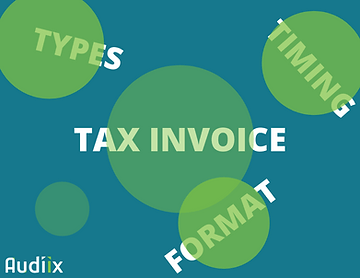Tax Invoice all you need to know

What is a Tax Invoice?
As per the UAE VAT legislations, a tax invoice is a written paper or electronic document which records the details of a taxable supply (goods or services) which has been made. Tax invoice is important for both sellers and buyers.
Issuing a valid tax invoice is important for suppliers as it will determine the tax period in which the VAT charged should be accounted for and paid to the FTA.
Receiving a valid tax invoice is important for buyers as it will serve as the primary evidence for recovering the VAT incurred as input tax.
When must a tax invoice be issued?
A VAT registered business or individual must issue an original tax invoice and deliver it to the buyer or the recipient in the following scenarios:
- When he makes a Taxable Supply (goods or services) subject to VAT at 5%.
- When he makes a Deemed Supply (free samples, commercial gifts, or goods used for personal use).
When it is NOT required to issue a tax invoice?
A tax invoice is not required to be issued in the following situations:
- When selling goods or services subject to VAT at 0%
- When selling goods or services that are exempt from VAT.
- When selling within the same tax group
Who must issue a tax invoice?
Seller-created tax invoice
Normally, the supplier of goods or services is liable to issue a tax invoice, however, it can be issued by the buyer or the agent of the supplier in certain situations.
Buyer-created tax invoice
In any situation where it may be easier for the buyer to identify the particulars of the supplied goods, he can issue the tax invoice on behalf of the seller. However, the must agree in writing that the seller will not issue a tax invoice in respect of any supply to the buyer.
The FTA guide gives an example of a scrap metal sold to a scrapyard, the quality and value of scrap metal might not be known until the scrap is received and valued at the scrapyard. In this case the buyer can issue the tax invoice.
Agent-created tax invoice
Where an agent (any VAT registered business or individual) sells goods or services on behalf of a supplier, the agent may issue the tax invoice.
The agent’s tax invoice must show his name, address, and TRN. However, the invoice should reference principal supplier’s name and TRN somewhere on the invoice.
Date of issuance of a tax invoice
A tax invoice must be issued within 14 calendar days of the date of supply.
The 14 days period also applies to continuous supplies or consecutive invoices effective from 1 Jan 2023 according to the VAT law amendment.
Summary tax invoice
Where a supplier makes several supplies of goods or services to the same buyer during a month, the supplier may issue a single tax invoice in the same month.
Types of tax invoices in the UAE
There are two types of Tax Invoices, full tax invoice and simple tax invoice. Simple tax invoice has less requirements in terms of the format.
Simple tax invoices may be issued in the following situations:
- Where the buyer is not registered for VAT in the UAE
- Where the buyer is registered for VAT in the UAE, but the total value of the invoice does not exceed AED 10,000.
In all situations other than the above a full tax invoice must be issued.
It worth mentioning that issuing a full tax invoice instead of simple tax invoice is optional. The seller may choose to issue a full tax invoice to all customers including non-VAT registrants.
The format of the Tax invoice
Full Tax Invoice

Full Tax Invoice
A valid full tax invoice must contain all the following
- The words “Tax Invoice” clearly displayed on the invoice
- Seller’s name, TRN, and address (P.O. Box at minimum)
- Buyer’s name, address, and TRN (if VAT registered)
- A sequential or a unique tax invoice number
- The date of issuing the tax invoice
- The date of supply (if different from the tax invoice date)
- A description of the goods or services supplied
- For each good or service, the unit price, the quantity or volume supplied, the rate of VAT and the amount payable expressed in AED
- The amount of any discount offered
- The gross amount payable expressed in AED
- The tax amount payable expressed in AED together with the rate of exchange applied for invoices in foreign currencies
- Where the invoice relates to a supply under which the recipient is required to account for VAT, a statement that the recipient is required to account for VAT, and a reference to the relevant provision of the Law. Example: a B2B gold jewellery transaction is subject to reverse charge mechanism where the buyer will account for the VAT (input & output). The Seller shall put the statement in the tax invoice.
Simple Tax Invoice
A valid simple tax invoice must contain all the following:

Simple Tax Invoice
- The words “Tax Invoice” clearly displayed on the invoice
- Seller’s name, TRN, and address (P.O. Box at minimum)
- The date of issuing the tax invoice
- A description of the goods or services supplied
- The total consideration (invoice total)
- The VAT amount charged
- Tax Invoice in foreign currency
Tax invoices issued in a foreign currency must show the following:
- The tax amount payable converted to AED
- The exchange rate used for the conversion (as per UAE’s central bank exchange rate at the date of supply)
Rounding
Full tax invoices should be rounded on a line item basis to the nearest Fils (2 decimals)
Simple tax invoices should be rounded on a total basis to the nearest Fils (2 decimals)
[sc name=”disclaimer”][/sc]

